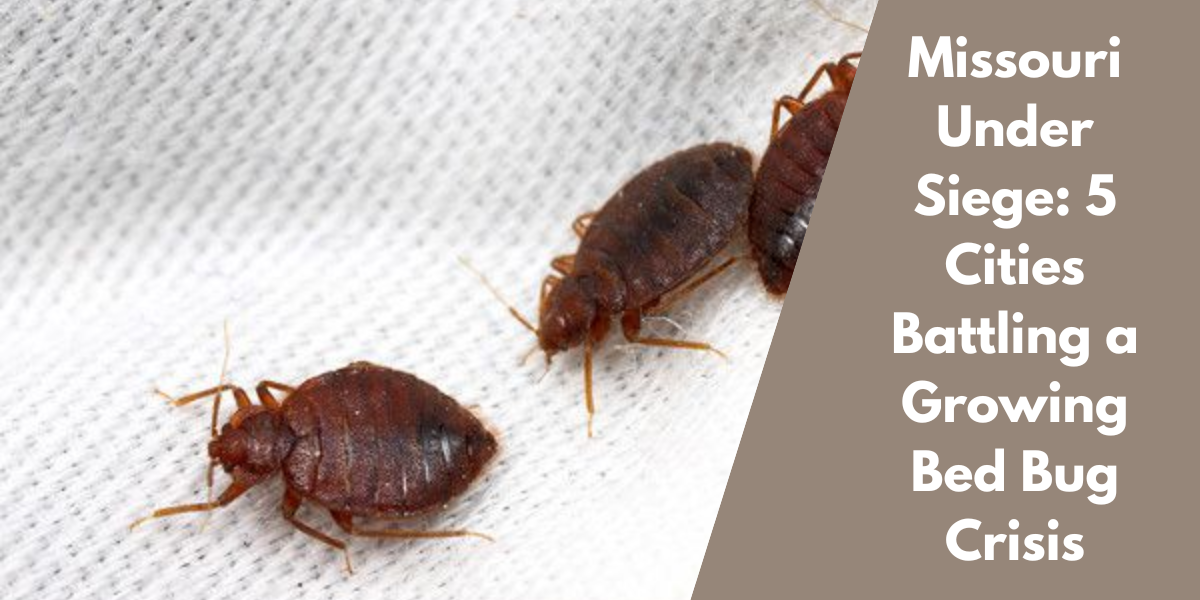Missouri is not an exception to the rule that bed bugs are becoming an increasingly prevalent problem in many regions of the United States. Recently, there has been a concerning rise in the number of bed bug infestations across the state of Missouri, and localities all across the state are having a difficult time controlling and getting rid of these annoying insects.
Bed bugs are little insects that are reddish-brown in color and feed on human blood. They have become a significant problem in homes, hotels, and public areas. Bed bugs are a serious annoyance. While they are fast spreading, it is crucial to have a solid understanding of what is driving this issue and how towns in Missouri are fighting back against it.
The Rise of Bed Bug Infestations in Missouri
There has been a major increase in the number of bed bug infestations in Missouri, as has been the case in a number of other states. Insects like this are difficult to identify, and even more challenging to eradicate. They are able to conceal themselves in gaps and crevices, and they frequently move through luggage, used furniture, and even within public transportation without being discovered. Bed bugs are able to quickly reproduce after they have entered a building, which causes infestations to spread out of control.
There is a rise in the number of bed bug infestations due to a number of different circumstances. An increase in travel, particularly travel across international borders, has been a significant contributor to the spread of these insects. In addition, bed bugs have developed a greater resistance to the chemicals that are used to eradicate them, which makes it even more difficult to keep their number under control.
Missouri cities that are struggling with the bed bug problem
The most populous cities in Missouri, such as St. Louis, Kansas City, Springfield, Columbia, and Jefferson City, are all experiencing an increase in the number of cases of bed bug infestations. Bed bugs are able to conceal themselves and reproduce rapidly, which is why these cities are taking active steps to avoid and eradicate the problem. However, the problem continues to worsen because of these characteristics.
The city of St. Louis has become one of the most severely affected places in the state of Missouri, with residential areas and hotels both having to deal with infestations. Raising awareness among citizens and providing support for individuals who require assistance with treatment have been the primary focuses of the city throughout this time.
The city of Kansas City is likewise experiencing difficulties with bed bugs. There is a greater likelihood of bed bugs spreading throughout the city due to the huge number of individuals who move in and out of the city as well as the city’s dense population. To handle the problem as swiftly as possible, local officials are collaborating with professionals in the field of pest management.
Springfield: Additionally, there has been a discernible increase in the number of reports of bed bugs in Springfield. The city has been forced to develop educational campaigns and collaborate with professionals in the field of pest control as a result of the fact that a large number of apartment complexes and rental properties in the area have become infestation hotspots.
Columbia: An rise in the number of complaints regarding bed bugs has been observed in Columbia, which is the location of the University of Missouri, particularly in student accommodation. There has been a collaborative effort between the institution and the local government to prevent the spread of bed bugs to private residences and commercial establishments.
Jefferson City Similar to other cities, Jefferson City has also been affected by the bed bug epidemic. There is a concerted effort being made by the state capital to educate the general people about the symptoms of bed bugs and the methods that can be utilized to deal with an infestation. This includes the significance of employing professional pest control firms to tackle the problem.
Strategies for the Elimination of Bed Bugs
Cities all around the state of Missouri are taking a variety of precautions in order to slow the spread of bed bugs. To educate the populace on how to identify bed bugs and stop their spread, public education programs have been developed. Bed bug inspections should be performed on a regular basis, and property owners should take prompt action in the event that an infestation is discovered.
In addition, a number of municipalities are collaborating with professionals in the field of pest management to eradicate bed bugs. These professionals employ a variety of treatments, including application of heat, the application of chemical pesticides, and the utilization of mattress encasements. Because bed bugs are unable to survive at high temperatures, heat treatments are highly successful. This is because heat may kill bed bugs at any stage of their development.
In addition, local governments are encouraging citizens to report infestations so that they can be dealt with promptly and prevent the infestations from spreading to other properties. There are numerous communities that provide assistance programs to patients in order to aid them with the cost of treatment, particularly for households with modest incomes.
A problem that will not go away overnight is the bed bug crisis that has been plaguing cities in the state of Missouri. It is necessary for local governments, professionals in the field of pest control, and people to make consistent efforts in order to reduce the spread of these pests. When it comes to preventing infestations, awareness and education are essential components, as is taking immediate action if a problem occurs. As the state of Missouri continues to fight against this rising problem, it is becoming increasingly apparent that a community-wide approach is required in order to maintain control over these pests.


 by
by 

